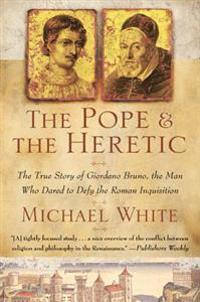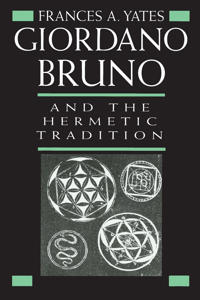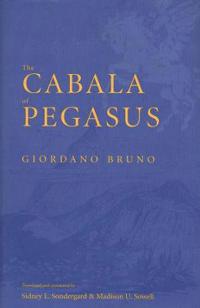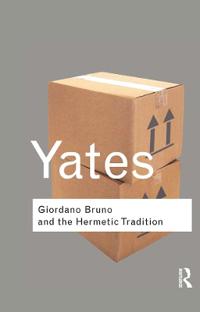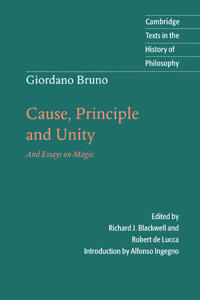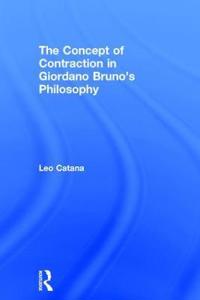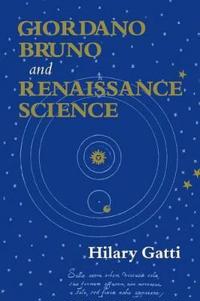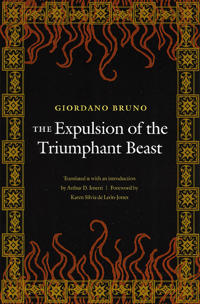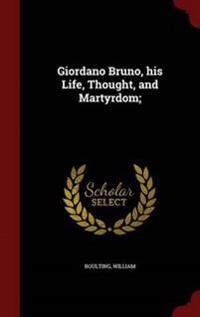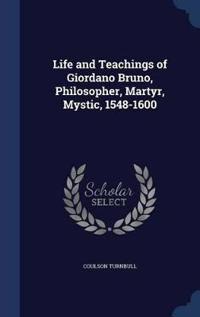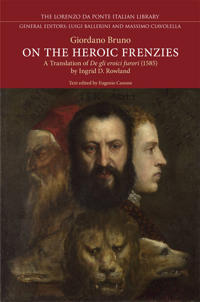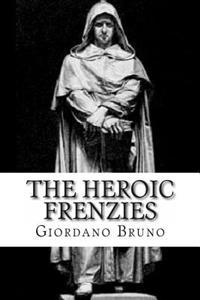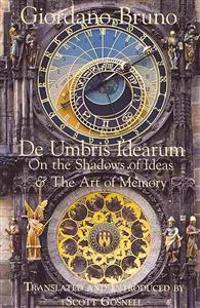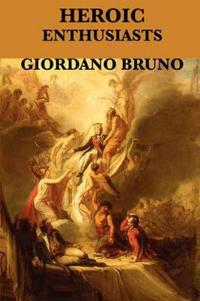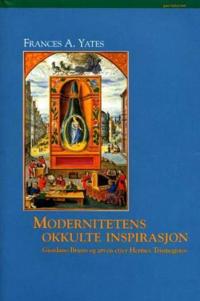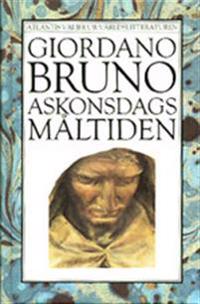The Pope and the Heretic: The True Story of Giordano Bruno, the Man Who Dared to Defy the Roman Inquisition (Häftad)
avMichael White
ISBN: 9780060933883 - UTGIVEN: 200310Profiles Catholic priest and natural philosopher Giordano Bruno, whose pursuit of an all-encompassing system of thought and radical theories earned him the patronage of powerful royals, inspired top thinkers throughout history, and caused him to be executed for heresy. Reprint. 15,000 first printing[...]
Giordano Bruno (Häftad)
avIngrid D. Rowland
ISBN: 9780226730240 - UTGIVEN: 2009-09Giordano Bruno (1548-1600) is one of the great figures of early modern Europe, and one of the least understood. Ingrid D. Rowland's biography establishes him once and for all as a peer of Erasmus, Shakespeare, and Galileo - a thinker whose vision of the world prefigures ours. Writing with great verv[...]
Giordano Bruno and the Hermetic Tradition (Pocket)
avFrances Amelia Yates
ISBN: 9780226950075 - UTGIVEN: 199102Reprint of the book originally published by U. of Chicago Press in 1964 and endorsed by BCL3 . Annotation copyright Book News, Inc. Portland, Or.[...]
The Cabala of Pegasus (Inbunden)
avGiordano Bruno
ISBN: 9780300092172 - UTGIVEN: 2002-10Giordano Bruno's "Cabala del Cavallo Pegaseo" ("The Cabala of Pegasus") grew out of the Italian philosopher's experiences lecturing and debating at Oxford in early 1584. This volume contains both the English and Italian versions of the work as well as annotations.[...]
Giordano Bruno and the Hermetic Tradition (Häftad)
avFrances A. Yates
ISBN: 9780415278492 - UTGIVEN: 200204Giordano Bruno is known as the Prophet of the New Age, and his vision of an infinite universe grounded in science is increasingly celebrated. One of the principal forces behind his rediscovery was the great British historian Frances Yates. In calling attention to Giordono Bruno, she paved the way f[...]
Cause, Principle and Unity (Pocket)
avGiordano Bruno, Robert De Lucca, Richard J. Blackwell
ISBN: 9780521596589 - UTGIVEN: 199812Giordano Brunoâs notorious public death in 1600, at the hands of the Inquisition in Rome, marked the transition from Renaissance philosophy to the Scientific Revolution of the seventeenth century. In his philosophical works he addressed such delicate issues as the role of Christ as mediator and[...]
Essays on Giordano Bruno (Övrig)
avHilary Gatti
ISBN: 9780691148397 - UTGIVEN: 2010-10-18This book gathers wide-ranging essays on the Italian Renaissance philosopher and cosmologist Giordano Bruno by one of the world's leading authorities on his work and life. Many of these essays were originally written in Italian and appear here in English for the first time. Bruno (1548-1600) is prin[...]
The Concept of Contraction in Giordano Bruno's Philosophy
ISBN: 9780754652618 - UTGIVEN: 2005-10Through the concept of contraction, Giordano Bruno (1548-1600) endeavoured to explain the relationship of God to his Creation in a way that conformed with his pantheistic view of nature as well as his heterodox view of man's relationship to God. The concept of contraction is twofold. In the ontologi[...]
Giordano Bruno and Renaissance Science (Häftad)
avHilary Gatti
ISBN: 9780801487859 - UTGIVEN: 200201The Renaissance philosopher Giordano Bruno was a notable supporter of the new science that arose during his lifetime; his role in its development has been debated ever since the early seventeenth century. Hilary Gatti here reevaluates Bruno's contribution to the scientific revolution, in the process[...]
The Expulsion of the Triumphant Beast (Häftad)
avGiordano Bruno
ISBN: 9780803262348 - UTGIVEN: 200502'Among the heretics of every age, we find men who are filled with the highest kind of religious feeling', Albert Einstein said. He might have been referring to the sixteenth-century Italian philosopher Giordano Bruno, who was tried by two Inquisitions and burned at the stake in Rome in 1600. Bruno's[...]
Life and Teachings of Giordano Bruno, Philosopher, Martyr, Mystic, 1548-1600
ISBN: 9781340018016 - UTGIVEN: 2015-08On the Heroic Frenzies (Inbunden)
avGiordano Bruno, Ingrid D. (TRN) Rowland, Eugenio (EDT) Canone
ISBN: 9781442643895 - UTGIVEN: 2013-09Italian astronomer and Dominican friar Giordano Bruno (1548-1600), found guilty of heresy by the Roman Inquisition and burned at the stake, has long been an enigma of early modern European philosophy. His central 1586 work On the Heroic Frenzies has shown a particular need for a fresh examination. T[...]
Giordano Bruno
ISBN: 9781466895843 - UTGIVEN: 2016-04Giordano Bruno is one of the great figures of early modern Europe, and one of the least understood. Ingrid D. Rowland's pathbreaking life of Bruno establishes him once and for all as a peer of Erasmus, Shakespeare, and Galileo, a thinker whose vision of the world prefigures ours. By the time Bruno w[...]
de Umbris Idearum: On the Shadows of Ideas (Häftad)
avGiordano Bruno
ISBN: 9781492329961 - UTGIVEN: 2013-09Modernitetens okkulte inspirasjon; Giordano Bruno og arven etter Hermes Trismegistos (Inbunden)
avFrances A. Yates
ISBN: 9788253020952 - UTGIVEN: 2001Forfatteren viser i denne boken den viktige rollen mange okkulte retninger spilte i renessansen, og hvordan disse var med på å forme selve epoken og ettertiden. I fokus er filosofen, naturvitenskapsmannen og den kjetterdømte Giordano Bruno. Avgjørende for renessansens okkultisme var gjenoppdagel[...]
Askonsdagsmåltiden (Inbunden)
avGiordano Bruno
ISBN: 9789174861037 - UTGIVEN: 199409När Giordano Bruno den 17 februari 1600 brändes på bål på Campo dei Fiori i Rom ändades ett liv som hade präglats av opposition mot kyrkans dogmer om världsalltet.
Under hela sitt liv tvingades Bruno flacka omkring i Europa på flykt undan de kyrkliga myndigheterna. Han förkunnad[...]

